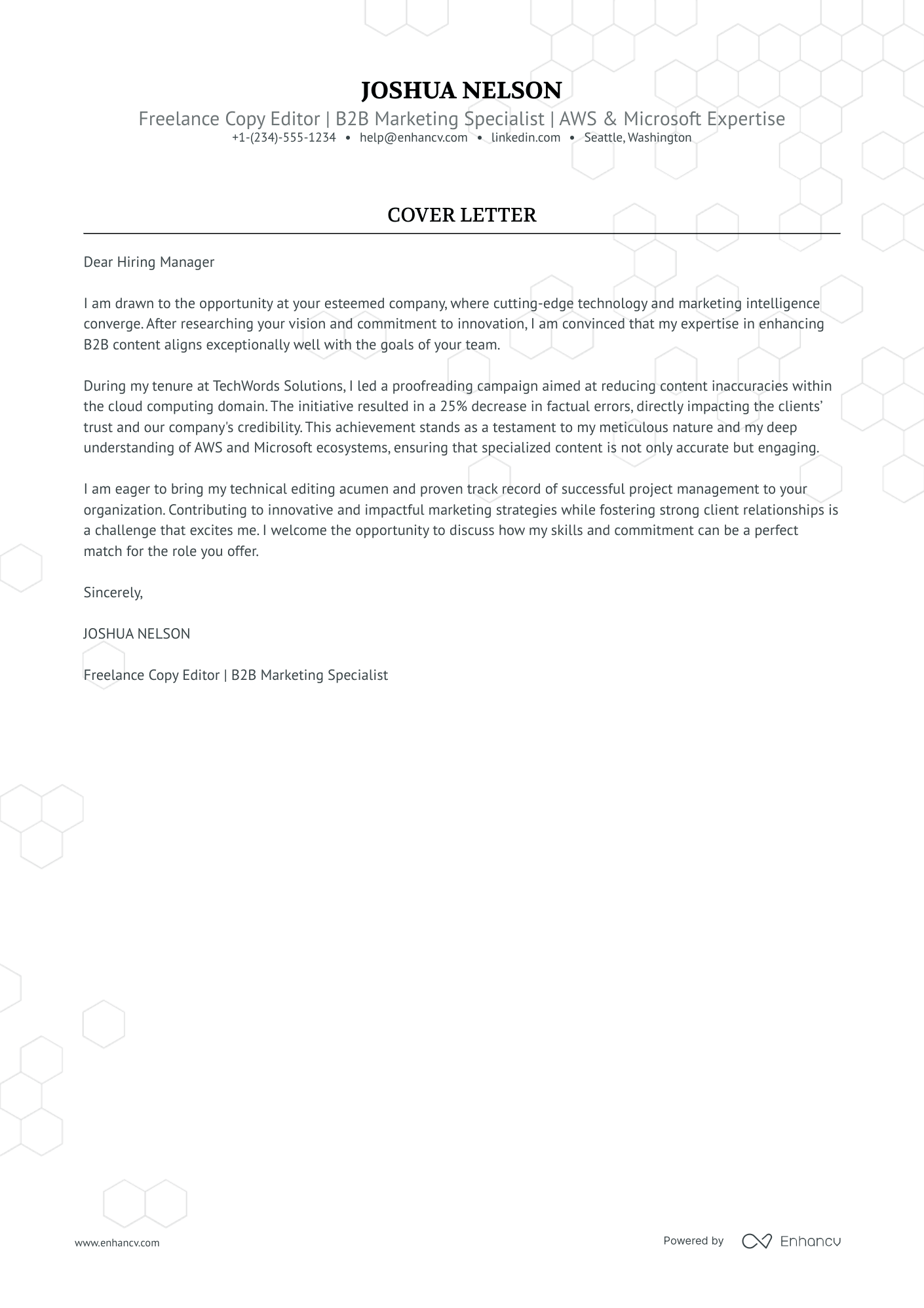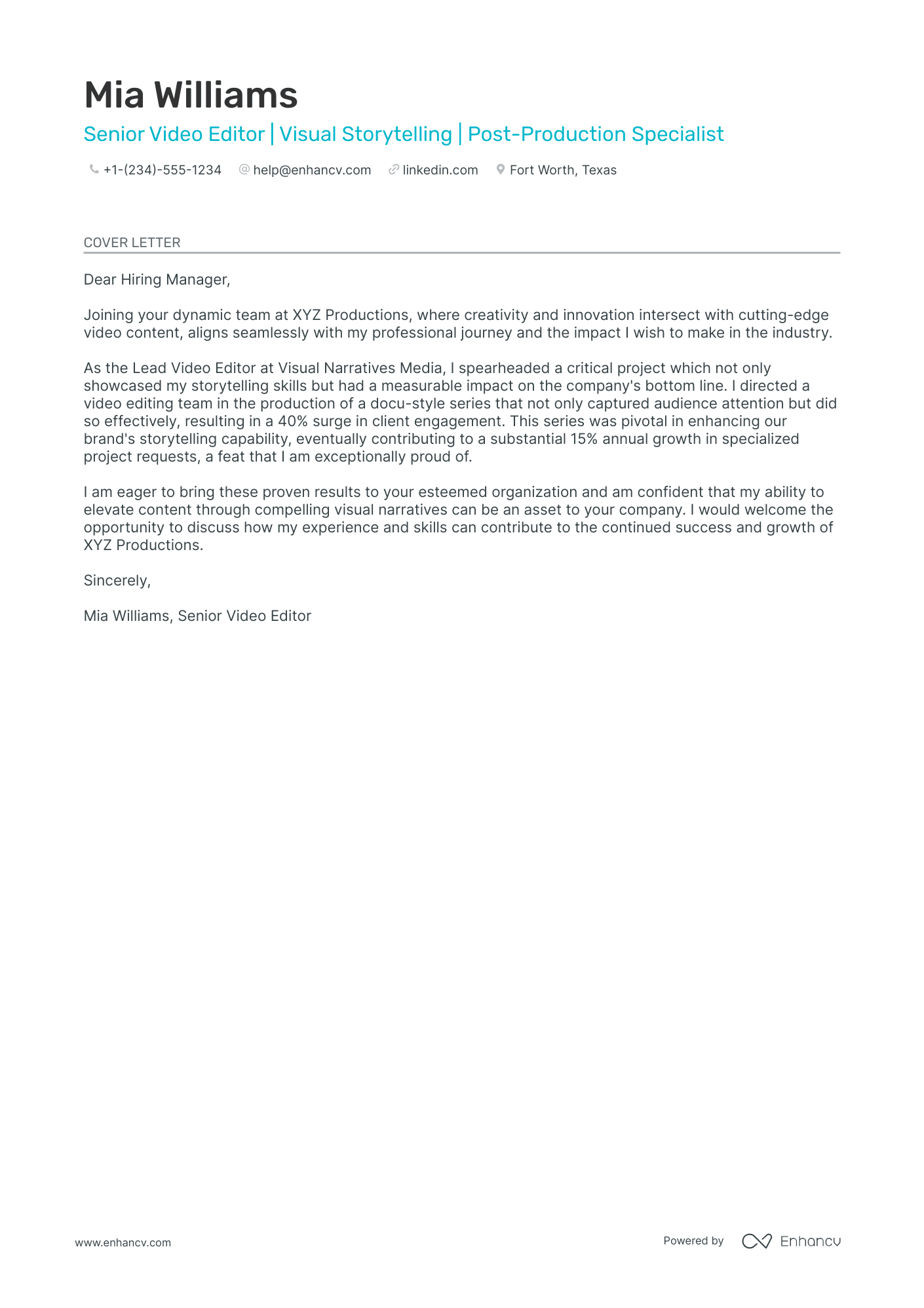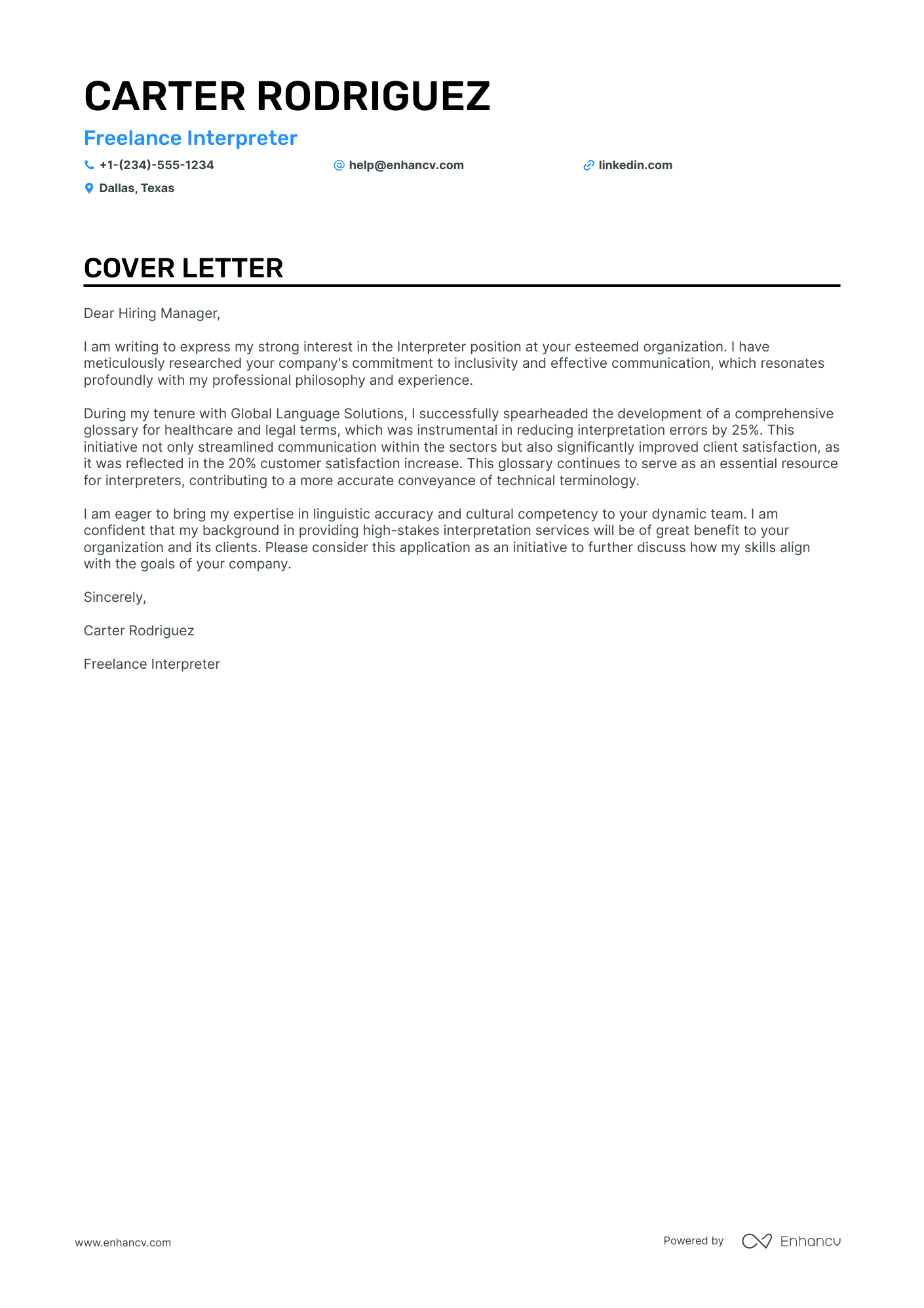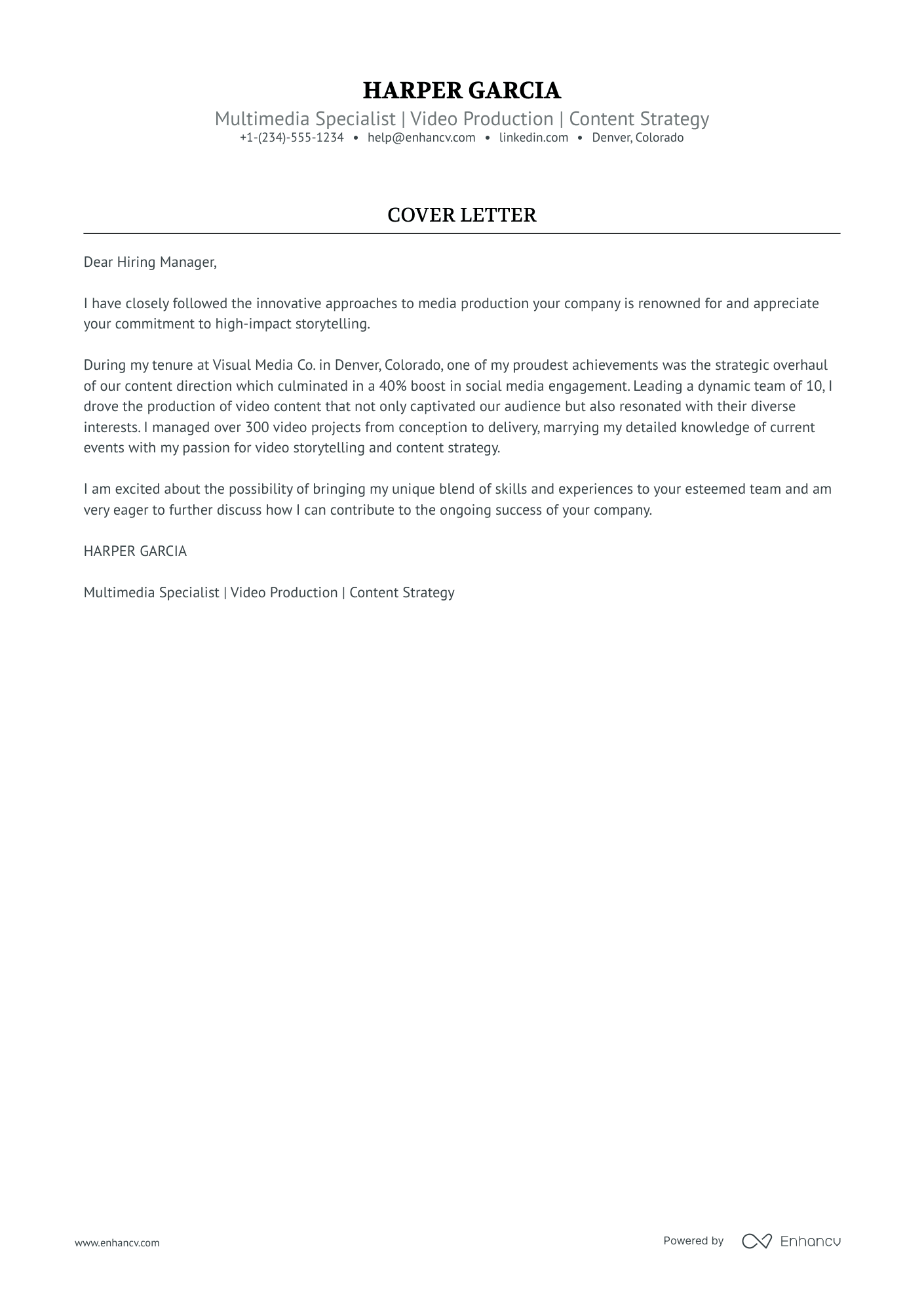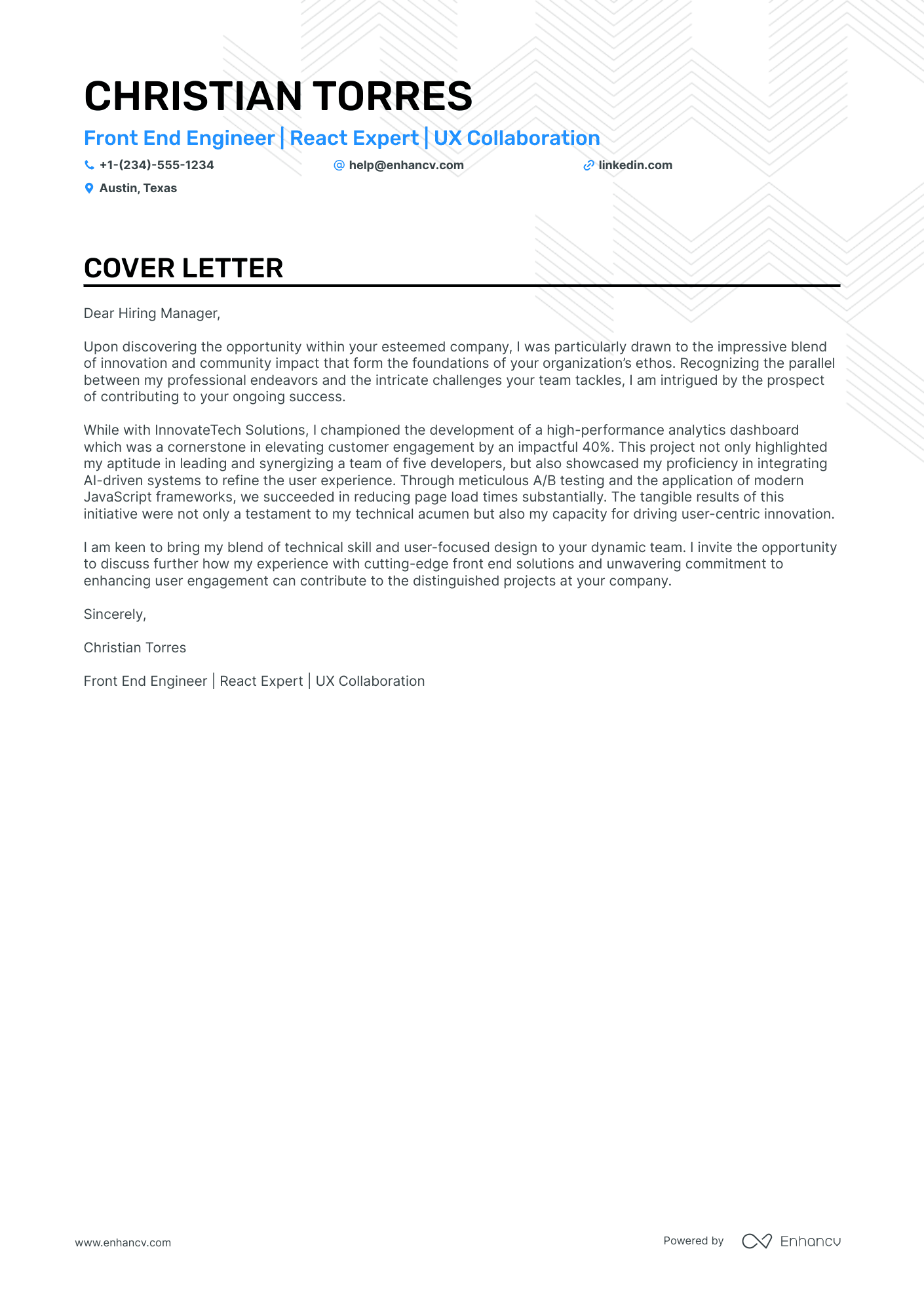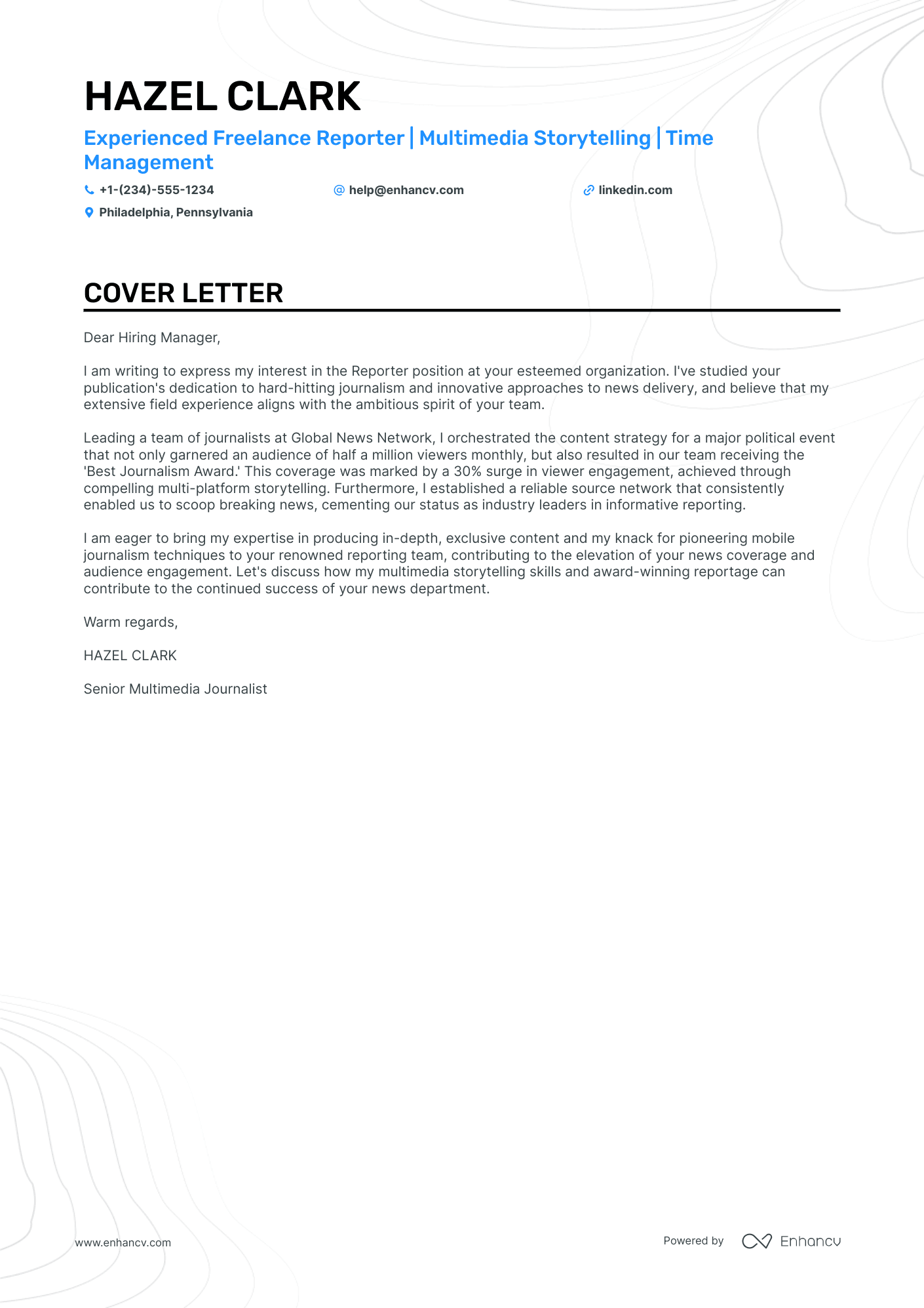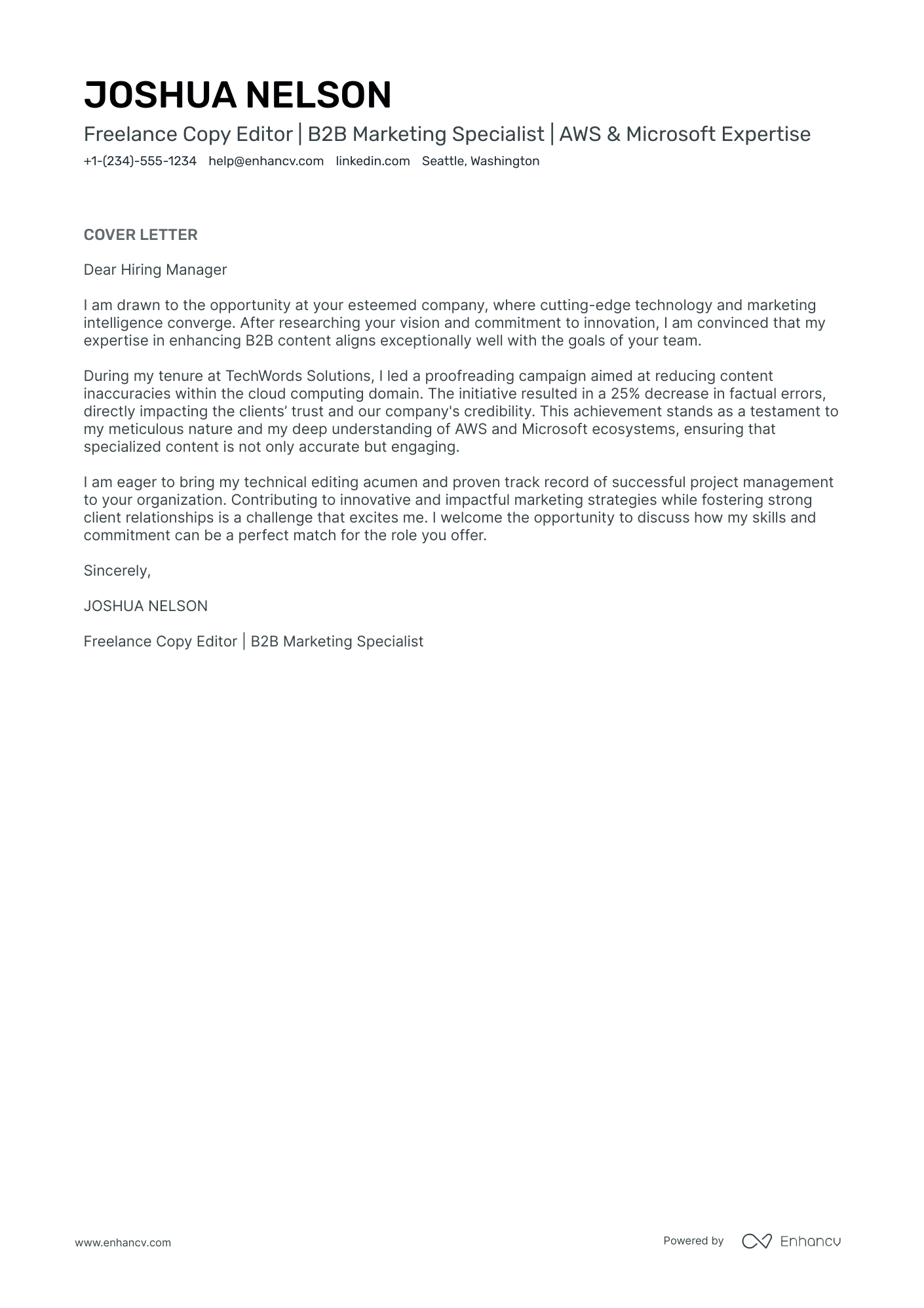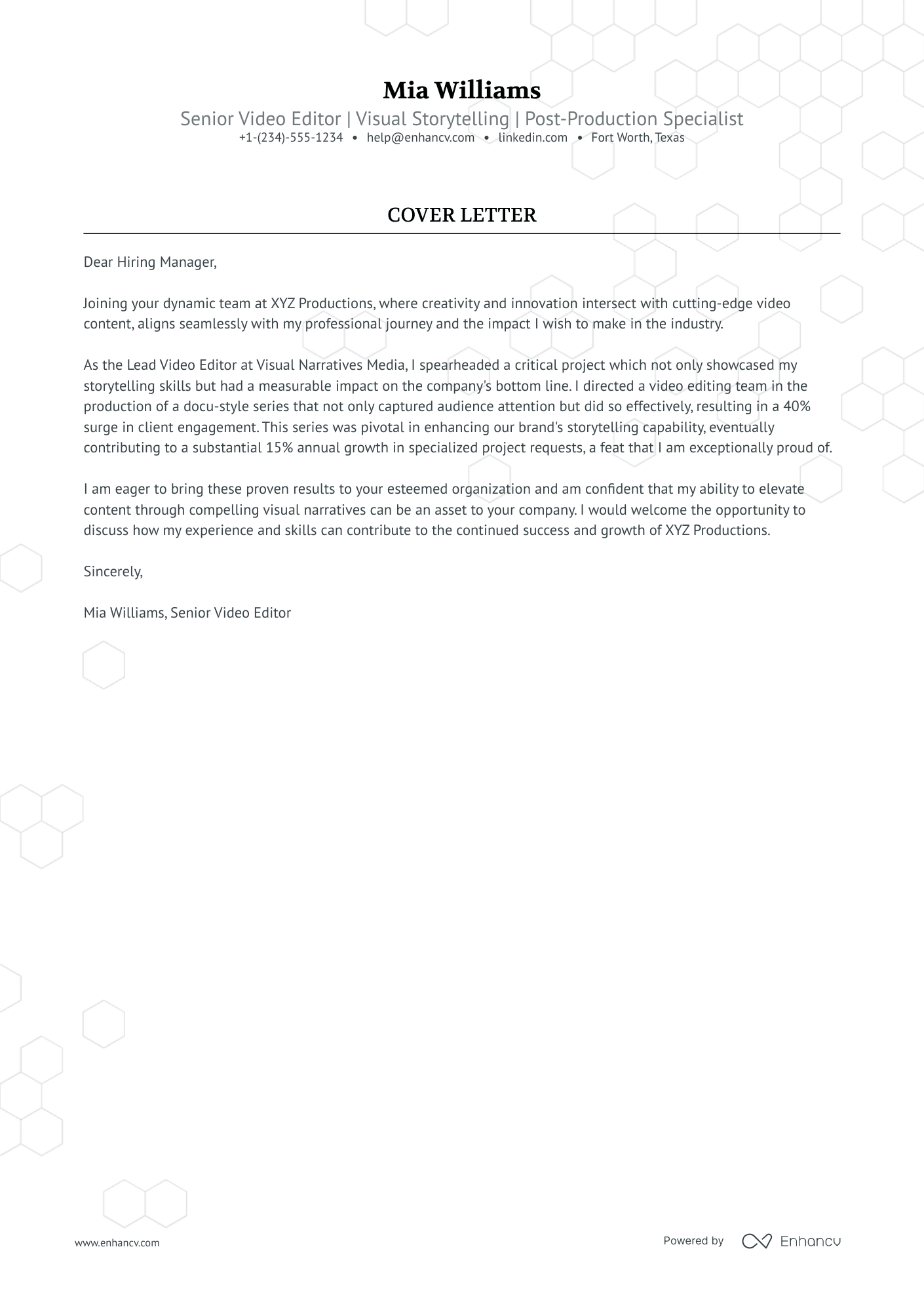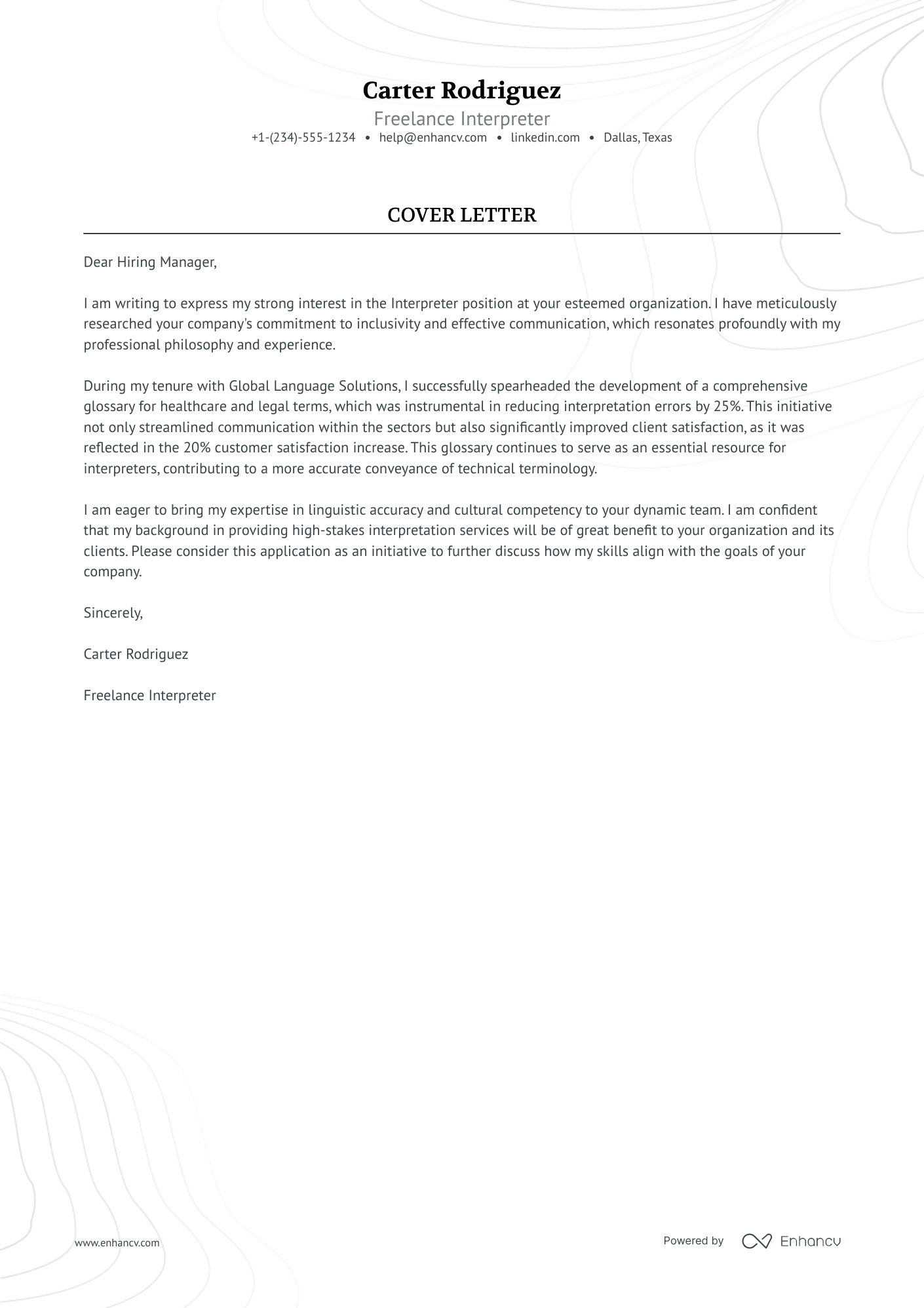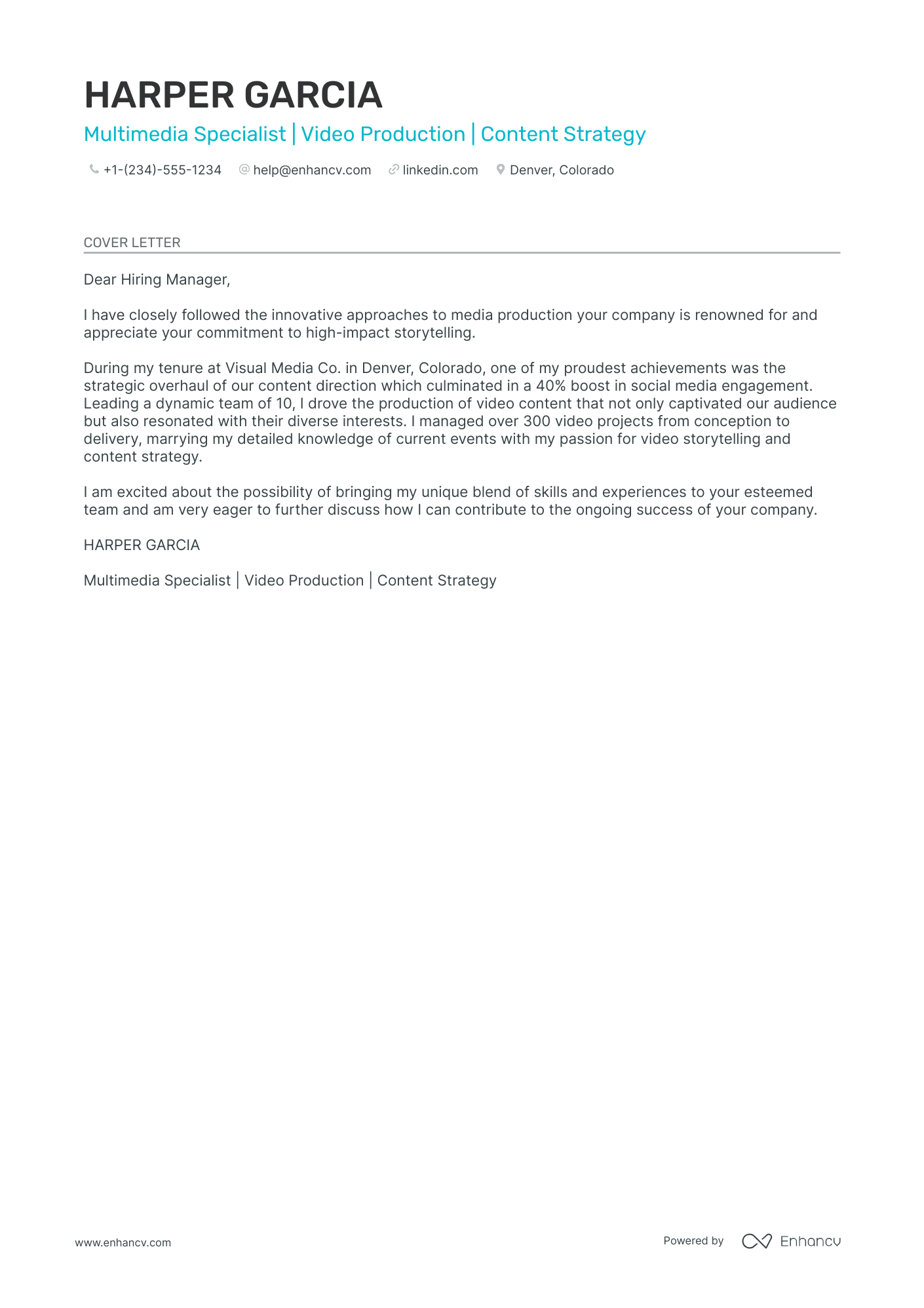Writing a freelancer cover letter often feels like a tough puzzle just when you thought your job application was complete. You've polished your resume, only to realize your cover letter can't simply rehash that information. Instead, it must spotlight a pivotal professional triumph, weaving a compelling narrative without tipping into clichés. This delicate balance requires a mix of formality and personality, all condensed within the tight confines of one page. Let's guide you through crafting a cover letter that stands out, just like your proudest moment.
- Step your best foot forward in the freelancer cover letter introduction;
- Be inspired by other professionals' certified cover letters;
- Structure your freelancer cover letter to feature what matters most;
- Close off your freelancer cover letter to make a memorable impression on recruiters.
But where to start writing? Upload your resume into Enhancv's AI, which will prepare your freelancer cover letter (all you need to do is personalize it, and you'll be good to go).
If the freelancer isn't exactly the one you're looking for we have a plethora of cover letter examples for jobs like this one:
Drop your resume here or choose a file.
PDF & DOCX only. Max 2MB file size.
Freelancer cover letter example
STEPHANIE MOORE
Tampla, FL
+1-(234)-555-1234
help@enhancv.com
- Highlighting relevant experience and past successes (e.g., organizing a charity event that raised significant funds) directly showcases the applicant's ability to manage substantial projects and achieve financial targets, both of which are critical for an event coordinator.
- Expressing knowledge and admiration for the prospective employer’s work conveys the applicant's genuine interest in the company and helps establish a connection with the hiring manager.
- The mention of specific skills such as negotiation and logistic management is important for the event coordinator role, as it assures the employer of the applicant's capability to handle the complexities of event planning and execution.
- Demonstrating the impact of the applicant's work (e.g., increased community support) aligns with the organization's aim to create memorable experiences and adds value to the applicant's profile by showing they understand and share the company’s objectives.
What should your freelancer cover letter look like - formatting and organizing your information
Have you ever wondered what are the must-have sections you need to include in your freelancer cover letter? Our builder sets those up for you with:
- Header - dedicated to your contact information, the role you're applying for, and the date (don't forget to include your name);
- Greeting and opening paragraph - to create a personalized and memorable experience for recruiters;
- Body paragraph - emphasizing your skill set and knowledge that aligns with the role and helps you to stand out;
- Closing paragraph - leaving a great impression and ending with an optional signature.
Use a cover letter template to discover the best formatting for your freelancer cover letter: that is single-spaced paragraphs and wrapping your content in a one-inch margin.
Ensure that both your resume and freelancer cover letter are in the same font. Stand apart from the crowd by using modern, yet simple fonts, like Chivo and Rubik, instead of the overused Arial and Times New Roman.
Did you know that the Applicant Tracker System (or ATS) won't be assessing your freelancer cover letter? Instead, submit your profile in PDF to recruiters to keep the same formatting and the design intact.
Skip the hassle of writing a cover letter. Use our free cover letter generator and get it done in moments.
The top sections on a freelancer cover letter
- Header: Includes the freelancer's name, contact information, and the date, essential for providing the recruiter with immediate identification and means of contact.
- Greeting: Addresses the recruiter or client directly, if their name is known, to establish a personal connection and show attention to detail.
- Introduction: Briefly introduces the freelancer, mentioning their main area of expertise and enthusiasm about the opportunity, to capture the recruiter's interest right away.
- Body: Outlines the freelancer's relevant skills, experience, and successful projects or outcomes that relate to the job at hand, demonstrating their capability and fit for the role.
- Closing: Ends with a call to action, such as inviting the recruiter to discuss the project in further detail, and expresses gratitude for considering the application, leaving a positive and proactive final impression.
Key qualities recruiters search for in a candidate’s cover letter
- Proven track record of successful projects: Demonstrates reliability and the ability to deliver quality work, which is crucial in a role with no long-term employer oversight.
- Specialized skill set: Highlights expertise relevant to the specific freelance job, showing the recruiter you have the necessary technical or creative skills.
- Strong communication skills: Essential for understanding project requirements, setting expectations, and maintaining workflow without in-person supervision.
- Time management and organization: Shows you can handle multiple projects efficiently, meet deadlines, and organize tasks effectively, which is critical when working independently.
- Adaptability and problem-solving: Indicates that you can handle the unpredictable nature of freelance work and adjust to new challenges and changes in project scope.
- Positive testimonials or references: Provides social proof of your professionalism and the quality of your work, instilling confidence in potential clients about your reputation.
How to greet recruiters in your freelancer cover letter salutation
As the saying goes, "You never get a second chance to make a first impression."
Write your freelancer cover letter salutation to be more personalized to the actual hiring manager, who is set to assess your profile by:
- greeting them on a first-name basis, if you have previously communicated with them (e.g. "Dear Sam,");
- using their last name, if you have more formal communication or haven't spoken to them (e.g. "Dear Mr. Harrows" or "Dear Ms. Marshall");
- writing "Dear HR Team" or "Dear Hiring Manager", if you have no clue about who's recruiting for the role.
Search on LinkedIn, Google, or the company website to find information as to the recruiter's name.
In any case, avoid the impersonal "Dear Sir or Madam".
List of salutations you can use
- Dear Hiring Manager,
- Dear [Team Name] Team,
- Dear [Company Name] Recruiter,
- Dear Mr./Ms. [Last Name],
- Dear [First Name] [Last Name],
- Dear [Department] Department,
Introducing your profile to catch recruiters' attention in no more than two sentences
The introduction of your freelancer cover letter is a whole Catch 22 .
You have an allocated space of no more than just a paragraph (of up to two sentences). With your introduction, you have to stand out and show why you're the best candidate out there.
Set out on a journey with your freelancer cover letter by focusing on why you're passionate about the job. Match your personal skills and interests to the role.
Another option for your freelancer cover letter introduction is to show you're the ideal candidate. Write about how your achievements and skills are precisely what the company is looking for.
However you decide to start your freelancer cover letter, always remember to write about the value you'd bring about. Making it both tangible (with your metrics of success) and highly sought out.
Storytelling in the middle (or body) of your freelancer cover letter
You've got your whole resume sorted, detailing your achievements and skills. What else can you write in your freelancer cover letter?
For starters, take the time to re-assess the job requirements and re-discover the most crucial skills and requirements (or keywords).
After making a list of these important keywords, look back on your experience to select just one of your past accomplishments.
Choose the achievement that is the most noteworthy, relevant to the role, and matches the required skills.
Use the next between three and six paragraphs to narrate how:
- you've grown your skill set, thanks to your achievement;
- you'd use the know-how you've gained in your new role;
- your accomplishment could help your potential employers grow.
Remember that recruiters don't need a retelling of your whole resume, but want to find out what makes you, you.
A sincere and original way to end your freelancer cover letter
When writing their freelancer cover letter, candidates tend to use one of these phrases, "Sincerely yours" or "I look forward to hearing from you".
Both statements show good manners, but your cover letter should end in a more actionable manner.
Write about:
- how you see yourself growing in the role/organization;
- the benefits you would bring about (you'd impress even more with tangible metrics);
- the next steps in the process (provide your availability for interviews).
Lacking experience: here's how to write your freelancer cover letter
As a candidate with no experience, it's important to be honest from the get-go of your application.
Use your freelancer cover letter to sell your unique talents. Choose an accomplishment from your academic background or your volunteer work to show the skills that are relevant to the role.
Focus on your career objectives and how you see the job to align with them. Be specific and, at the same time, realistic about where you picture yourself in five years.
Key takeaways
Summarizing the most important aspects in writing your freelancer cover letter, remember to:
- Create a personalized freelancer cover letter for each role you apply for, that includes the recruiter's name in the salutation;
- Format your freelancer cover letter with single-spacing, one-inch margins, and a modern, yet ATS-friendly font;
- Always start off your freelancer cover letter with two sentences that reflect what is most important about your application;
- Your freelancer cover letter body should feature your biggest accomplishments and the job-relevant skills it has taught you;
- Instead of opting for the "Sincerely yours" ending, close your freelancer cover letter with a nod to the future with what you aim to achieve in this potential role.
Freelancer cover letter examples
By Role
